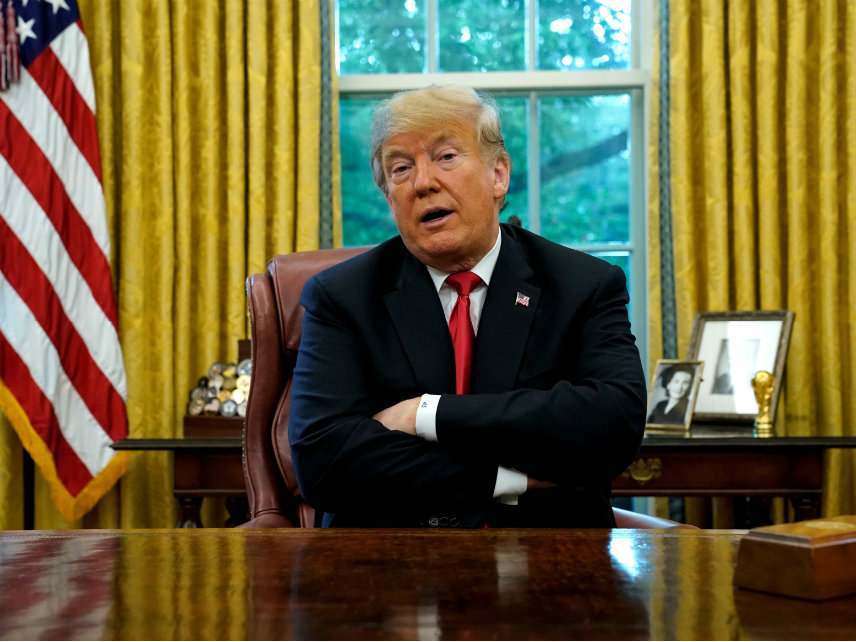Trump Isn't Serious About Balancing the Budget
As long as Medicare, Social Security, and the Pentagon can't be touched, it's hard to believe the president has discovered his inner fiscal hawk.

When it comes to reducing the federal deficit, take President Donald Trump neither literally nor seriously.
Trump says he's worried about the growing gap between how much the government spends and how much revenue it takes in—as well he should be, with the deficit on pace to surpass $1 trillion during the current fiscal year. This is a new thing for him. Trump came into office declaring himself the "king of debt" and showed very little concern for deficit spending as his Republican allies in Congress cut taxes and busted through spending caps to boost the budgets of both the military and domestic programs. That combination caused the national debt to rise more than $2 trillion on Trump's watch.
Now the president "is changing his tune on the budget in public statements," write Josh Dawsey and Damian Paletta in a lengthy piece published Sunday by The Washington Post.
Trump's inner deficit hawk allegedly emerged last month, when he abruptly ordered his cabinet secretaries to prepare plans for 5 percent across-the-board cuts. In private meetings and at public events since then, Trump has made repeated comments about the need to pay down the debt, Dawsey and Paletta report from conversations with 10 administration officials.
Still, one of the biggest impediments to Trump's interest in cutting the deficit is Trump himself. Publically, the president has promised not to touch entitlement programs such as Social Security or Medicaid—indeed, protecting those programs from supposed Democratic efforts to change them is a prominent message at nearly every Trump rally. And privately, the Post notes, Trump has taken Pentagon cuts off the table.
Of course, entitlement spending is the biggest single driver of America's long-term deficit. Absent any changes to current law, those two programs alone will run a $100 trillion deficit over the next 30 years while the rest of the government will run a slight surplus, according to Congressional Budget Office projections. Military spending, which Trump urged Congress to hike to an all-time high earlier this year, will total $718 billion next year and dwarfs all other non-entitlement spending in the federal budget.
In other words, it's very difficult to be serious about balancing the budget without at least acknowledging that Social Security, Medicare, and the Pentagon will have to be part of the solution.
Beyond those big-picture problems, any attempt to bring the federal government's spending and revenue into balance will likely be stymied by the fact that Trump doesn't seem to understand the numbers he is dealing with. In a telling anecdote from the Post's Sunday story, Trump was reportedly surprised to learn that the chairman of the Joint Chiefs of Staff earns a mere $200,000 annually. Trump guessed $5 million and suggested that raises should be in order.
This fits into a pattern for the president. In July, Trump tweeted that his steel and aluminum tariffs would help pay down the national debt. The problem, as I wrote at the time, is that the tariffs are expected to generate about $21 billion this year, according to the Tax Foundation, a nonpartisan think tank. The national debt is $21 trillion.
The same problem blows a big hole in Trump's plan to shave 5 percent off all federal departments except the Pentagon. That sort of reduction in discretionary spending would save about $70 billion next year—or about 7 percent of the expected $1 trillion deficit.
Cutting $70 billion in discretionary spending is nothing to sneeze at, of course, and it's surely heartening to hear that Trump is interested in addressing the federal government's out-of-control spending. But the deficit is reaching such astronomical heights that it's realistically not possible to address it while keeping military and entitlement spending out of the discussion.
Even if Trump were serious about slashing federal spending, Congress' desires are ultimately more important—and Congress clearly wants to spend more money on pretty much everything. Last year, for example, the Trump administration made specific proposals for cutting food stamps, farm subsidies, and other discretionary programs. Overall, the proposed 2018 budget aimed to reduce federal spending by about 9 percent over 10 years.
The Republican-controlled Congress instead hiked spending by $400 billion. Trump then signed the budget deal.


Show Comments (121)